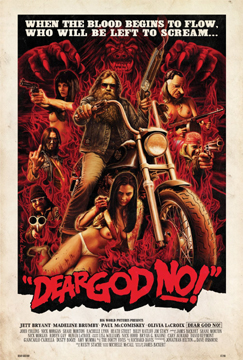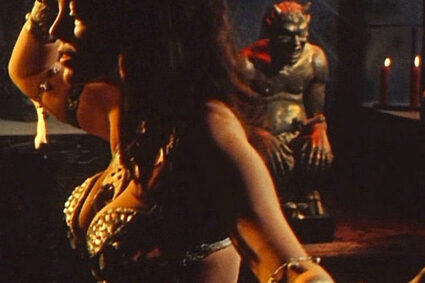
James Bickert’s DEAR GOD NO! is not fun for the whole family, it’s not the feel-good movie of the year, nor is it a movie to enjoy on date night. In fact, unless you’re a member of the coveted 18-34-year-old demographic, male and in the presence of others who are likewise members of the marketers’ Holy Grail, it’s safest to watch DEAR GOD NO! alone. However, it doesn’t matter whether you’re a sucker for Budweiser commercials or you can’t resist the exciting ads for Metamucil, you’ll enjoy this flick provided you appreciate the long and storied history of the cinematically strange.
An outlaw biker gang, The Impalers (their patches recall the impaled woman in CANNIBAL HOLOCAUST), go about raping and murdering the way the rest of us go to the park and toss the Frisbee around. It’s worth noting here that the first scene depicts one of The Impalers kicking a dead nun in the crotch, representing the rest of this meal in one single bite. Eventually the gang ends up at a strip club where they have a shootout with a rival biker gang. This involves several weapons, multiple sets of bare breasts, and lots of Karo Syrup and red food coloring.
Our surviving bikers, including Jett (Jett Bryant) and Randal (Shane Morton) retreat to an isolated cabin in northern Georgia, ostensibly an easy mark for a home invasion. Once inside, they encounter the venerable mad scientist, Dr. Marco (Paul McComiskey), his lovely wife Evelyn (Olivia LaCroix), and their odd daughter (?) Edna (Madeline Brumby). What begins as more of the same – rape, violence, sex and drugs, quickly turns into more than The Impalers had bargained for when some of the good doctor’s basement experiments are revealed.
Now, Horror Fans, I’m about to do more for the trend of attaching the ‘sploitation suffix to every word in the English language than has any other genre journalist, ever. So, exactly what is DEAR GOD NO!? Bickert’s mad movie is a ridiculous synthesis of just about every exploitation archetype I can think of and, yet, somehow it works. The list of grindhouse-era tropes includes Bikersploitation, Nunsploitation, Madscientistsploitation, Bigfootsploitation, a hint of Nazisploitation, all wrapped up in a little Strippersploitation bow.
The best way to describe Bickert’s envelope-pushing ode to sleaze is that it’s pure Super 16mm sex, drugs, and rock ‘n roll for bad people and serious cinephiles. Other than incredibly uncomfortable levels of misogyny and rape – unfortunate aspects of many notorious exploitation flicks — the movie is a blast in all the ways one can expect. It’s hilarious, disturbing, and exhilarating in a constant loop. While films like these are difficult to analyze in conventional terms, the effectiveness of DEAR GOD NO! is undeniable. You know it when you experience it. It’s viscerally gratifying (and get your minds out of the gutter).
How can I enjoy a movie that gleefully portrays deplorable acts such as rape, you ask? Well, first of all, artists should always be allowed to make offensive art, not matter what. This is something I suspect most of you agree with. Topic and Tone are two facets of art, not disqualifications. Genres provide expectations by way of each genre’s respective rules. Obviously, exploitation movies are enjoyable for reasons that do not include beneficent morality and positive representations of civil society. In other words, one must understand the context and the intent of depicting heinous acts. And besides, the perpetrators get their just deserts, and before you even run out of popcorn.
Given the tone and aesthetic DEAR GOD NO! aspires to represent, most of its “flaws” are purposeful choices and function as “meta-homage”. The ultra-violent, over the top, projectile nature of the movie’s gore FX is both charming (to people like us) and entertaining. And the mock-poor production values are legitimately funny rather than condescending like they are in some of this movie’s larger-budgeted peers.
Moreover, the cast is surprisingly, consistently good. The weird style of acting this movie surely required from its actors is executed so well that I’m compelled to ponder whether or not their performances are strokes of genius or just accidental. In the end, it doesn’t matter; the surreal performances of this cast are exactly what are required by this strange movie. Musician-turned-actor Jett Bryant as Jett the mountain-man leader of The Impalers is one of the film’s real strengths, as is Madeline Brumby’s performance of closet freak, Edna.
Hands down, one of the very best elements of this movie is the music. It’s absolutely lights out, showcasing a variety of new Stoner Rock and all of it jams. And within the context of the movie, it loudly reinforces the aesthetic Bickert’s aiming for. In fact, he seems to use the tunes on more than one occasion to pad his running time with lengthy striptease sequences. But with music this good, it’s difficult to complain about that.
Exploitation flicks have always been considered bad movies by classic standards. Don’t get me wrong. I’m not saying I don’t enjoy them, I’m just saying that they’ve always been considered terrible, and that’s part of their charm. However, through the soft-focus lens of retrospection, a significant group of filmmakers has been making new exploitation flicks fueled by their reverence for what’s essentially considered inspirational trash. Over the last five years we’ve been gifted with a bevy of homagesploitation flicks — GRINDHOUSE, MACHETE, HOBO WITH A SHOTGUN, and DEAD HOOKER IN A TRUNK, to name a few. These have been made by A-listers such as Quentin Tarantino and Robert Rodriguez, as well as by indie hotshots like Jason Eisener and the Twisted Twins – Jen and Sylvia Soska.
But James Bickert’s DEAR GOD NO! manages to feel distinct among its exploitation-renaissance peers. He’s managed to achieve a peculiar thing with his valentine to vile cinema. He’s made a very busy exploitation mash up, but one that functions as a cohesive story and without the overt irony or genre deconstruction that renders some similar movies into long and ponderous in-jokes. There are several elements of homage here, but few that function only as such. DEAR GOD NO! has gone down the rabbit hole of modern exploitation in earnest, and the result is a successfully entertaining and bizarrely offensive trip through cinema’s sleaziest style.

4 thoughts on “Dear God No! Movie Review”
Comments are closed.















A funny thing about exploitation is that I think even the most tasteful, demanding horror fans have soft spots in their black hearts for it. I suspect this is because exploitation, like its ancestors the pulps and the penny dreadfuls, distills horror to its essence (sex, violence and monsters), but also because it has such a shamelessly good time doing it. I know I want to write the best fiction I possibly can, but if people read my stuff and could picture it with a big, lurid, title font and a “Just 10 Cents!” sticker on the corner of the cover, I’d be pretty happy.
Yeah, exploitaton is the one place where it’s not only okay to explore taboos, filmmakers and viewers are expected to relish them. It’s a hell of a lot of fun. Plus, there’s a legacy there, 42nd St. NYC and all the maverick filmmakers from that scene and that era. I don’t know of too many horror film purists who don’t also love exploitation flicks. They’re like freaky kissing cousins.
I think the mark of a great exploitation film is the poster. In fact, the mark of any good movie is the poster…
No, but really what film isn’t exploitative? The entire film industry is based on exploiting trends and niches (some of them they create and others they try to capitalize on in the hopes of building franchises e.g. the comic book movie craze and the young adult novel craze).
I think exploitation films are interesting to watch not only because of how over the top they can be, but because of their satirical juxtaposition to the big budget industry whether its intentional or not.
It’s like making copies of copies just to see what kind of weird patterns will emerge from the original images’ degeneration. Exploitation films could also be categorized in a new sub-genre of film for the 21st century and beyond called necrotizing cinema or cinematic necrophilia, or maybe cine-inbreeding.
What I’m saying is, if I’m alive in five or ten years, I’d love to see what kind of insane retarded clone of Dear God No! hits the indie or viral video screens.
Dr. Hibbs, I completely agree with you regarding one-sheets and movie posters in general.
Regarding your other assertion, no, the film industry’s business strategies are not in any way, shape, or form a movie genre and neither are the broad functions movies sometimes fulfill (all movies are dramatic too, but not all movies are Dramas). But I’m certain you know that. Studios exploit markets, fill voids, etc. Using this iteration of the term “exploitation” to categorize movies is a wild stretch, and one that I assume is just rhetorical on your part.
Genres are defined by the artistic content of their respective movies and are thus named accordingly. Exploitation Films are movies in which the tonal and thematic thrust is generated by the explicit exploitation of cultural taboos, whether they are social, religious, racial, or sexual in nature. So, while I understand your point, you get there using a rhetorical flourish that creates a slippery slope on which words lose their definitions. For example, all plots are the by-products of the hope-vs.-fear dynamic. However, that certainly doesn’t mean that all movies are horror flicks. And if it had been a woman that wrote and directed THE EXPENDABLES, that wouldn’t make it a chick-flick. Again, I know you know all this. I just like to type.
On to the overall point I think you’re making: At the apex of the Exploitation Film craze (the 1970’s), the filmmakers shared similar circumstances (budget constraints, lack of experience, etc.) which led to their films sharing similar aesthetic qualities. However, these qualities had no relationship to their respective films’ concepts. In the current Homagesploitation craze, these aesthetic qualities are being referenced and recreated not out of necessity, but out of reverence for those original exploitation flicks in total, which includes the experience of watching them in grindhouse-style theaters and drive-ins.
So the modern homage comes in two flavors — the themes and style of the genre, and the meta-elements of the genre. It’s the latter type of homage that I find annoying. I’m not a huge fan of digitally adding scratches, pubes, and dead flies to the “film” or purposely adding poorly-dubbed audio, missing scenes, etc.
By and large, DEAR GOD NO! avoids this form of homage, although not completely.
Thanks for the comments.